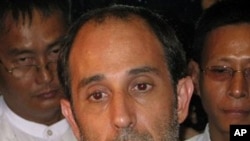A U.N. envoy for human rights in Burma says the new government is failing to address the widespread abuse of ethnic-minority groups.
The U.N. Special Rapporteur on human rights in Burma, Tomás Ojea Quintan, says the new government is doing little to prevent military abuses against ethnic minorities living along the border with Thailand.
The military has been fighting for decades against ethnic rebel groups wanting autonomy and has cited the internal conflict as a reason it needs to maintain a significant degree of power.
In November, Burma held its first election in two decades, saying it was a final step in its move from a military government to civilian rule. The election was widely criticized as neither free nor fair but merely a way for the military to maintain power.
Despite the installation of a civilian government, Quintana say nothing has been done to address the ongoing violence.
“Systematic militarization contributes to human-rights abuses," he said. "These abuses include land confiscation, forced labor, internal displacement, extrajudicial killings, and sexual violence. They are widespread. They continue today. And, they remain essentially unaddressed by the authorities.”
Quintana said a U.N. commission of inquiry may be needed to help with national reconciliation and accountability. He said in some cases, such as forced labor, the abuses are clearly state-sponsored.
“Myanmar may be the only or one of the only countries in the world where forced labor is being implemented by the state not private actors,” added Quintana.
Nonetheless, Quintana said there were some positive signs such as lawmakers raising questions about human rights and the treatment of ethnic groups.
"The questions included the possibility of a cease-fire in Kayin State," he said. "Also, the issue of citizenship status of Rohingyas, and whether amnesty would be granted to Shan political prisoners."
Quintana spoke to reporters in Bangkok after a one-week visit to Thailand that included meetings with activists, experts, and officials about the situation in Burma.
The U.N. representative was not able to visit Burma because authorities refused to give him a visa, but he met with Burma’s ambassador to Thailand. He also spoke by phone with Burma’s democracy leader, Aung San Suu Kyi, who he says supports the idea of a U.N. commission.
Quintana said national reconciliation required the participation of all stakeholders and needed to start with the release of more than 2,000 political prisoners jailed in Burma.
His comments echoed those of U.N. Special Envoy to Burma Vijay Nambiar, who was allowed to visit the country earlier this month.
Last week, U.S. Deputy Assistant Secretary of State Joseph Yun was also allowed in. He said the United States is willing to improve bilateral relations with Burma, but steps are needed toward democratic governance, respect for human rights, and the release of all political prisoners. He also conveyed U.S. concerns about Burma’s military relationship with North Korea.
Yun was the first U.S. official to visit Burma since the government was installed.
UN Rights Envoy Says Little Progress in Burma Despite New Government




